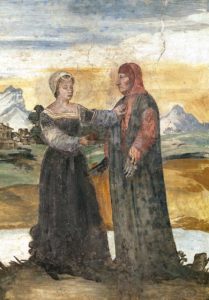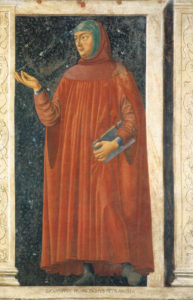Francesco Petrarca (1304-1374)
Here are my first two translations of Petrarca; more to come.
The poet is also known as “Petrarch” in English. I prefer to use his proper Italian name, Petrarca, and not that Latinized Anglicization but I have to include that English spelling on this page in order to capture search traffic that uses it.
I have translated these sonnets favoring meter over rhyme, which is my preference, in order not to have to over-manipulate the text just to produce rhymes which come more easily in Italian than in English.
Francesco Petrarca, Il Canzoniere, Sonnets n. 1 and 61.

Petrarca and Laura, fresco in the Casa di Francesco Petrarca, Arquà Petrarca near Padua; public domain. (click to enlarge)
Il Canzoniere, Sonnet n. 1
Translation © Chris DiMatteo 2017. All rights reserved.
To you who hear the sound, in scattered rhymes,
of all my sighs with which I fed my heart,
there was my early youthful heart’s mistake,
I was in part a different man than now,
Of all my different cries and wondering,
among my hopeless pain and hopeless wishes
wherever people know from living love,
I hope to find their pity and their pardon.
But now I know that all the people are
for quite a while laughing at my folly
and I do feel that shame inside myself;
My vanity has grown the fruits of shame
and my repentance, as I clearly know
that what we love of life is but a dream.
Translator’s note to n. 1:
In this translation, I found that the English version came to me in a meter different than that of the original; it is in a kind of iambic pentameter but with an extra syllable here and there. This is unlike n. 61 below, where both the original and my translation are in a dactyl meter.
Il Canzoniere, n. 1, testo originale
Voi ch’ascoltate in rime sparse il suono
di quei sospiri ond’io nudriva ‘l core
in sul mio primo giovenile errore
quand’era in parte altr’uom da quel ch’i’ sono,
del vario stile in ch’io piango et ragiono
fra le vane speranze e ‘l van dolore,
ove sia chi per prova intenda amore,
spero trovar pietà, nonché perdono.
Ma ben veggio or sí come al popol tutto
favola fui gran tempo, onde sovente
di me mesdesmo meco mi vergogno;
et del mio vaneggiar vergogna è ‘l frutto,
e ‘l pentersi, e ‘l conoscer chiaramente
che quanto piace al mondo è breve sogno.
Il Canzoniere, Sonnet n. 61
Translation © Chris DiMatteo 2017. All rights reserved.

Francesco Petrarca, by Andrea del Castagno, from the “Ciclo degli uomini e donne illustri” or “Circle of Illustrious Men and Women,” 1450, Galleria degli Uffizi, Florence; public domain. (click to enlarge)
Blessèd the day and the month and the year,
the season, the hour at that exact time,
and the beautiful country, the place I was captured
by two lovely eyes, to which I am bound.
And bless the first time that I lost my breath,
lovesick under the spell of Amore,
the bow and the arrows by which I was pierced,
the affliction and torments lie deep in my heart.
Bless also all of the verses I scatter,
calling the name of the woman I love,
and all of my sighs, my tears, my desire.
And blessèd are all of the pages where I
become famous by writing my thoughts upon them,
which are all about her and nobody else.
Translator’s note to n. 61:
I found that this Dactyl meter worked well in my translation as it does in the original sonnet and I was happy that I was able to keep this feature of the poem in my translation.
Il Canzioniere, n. 61 (testo originale)
Benedetto sia’l giorno e’l mese e l’anno
e la stagione e’l tempo e l’ora e’l punto
e’l bel paese e’l loco ov’io fui giunto
da’duo begli occhi che legato m’ànno;
E benedetto il primo dolce affanno
ch’ì ebbi ad esser con Amor congiunto,
e l’arco e le saette ond’ì fui punto,
e le piaghe che’nfin al cor mi vanno.
Benedette le voci tante ch’io
chiamando il nome de mia donna ò sparte,
e i sospiri e le lagrime e’l desio;
e benedette sian tutte le carte
ov’io fama l’acquisto, e’l pensier mio,
ch’è sol di lei; si ch’altra non v’à parte.
